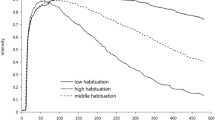Abstract
Both name and source information provide a context for the perceptual evaluation of odorants (Herz, J Exp Psychol 132(4): 595–606, 2003) that may also affect memory (Lyman and McDaniel, J Exp Psychol 16(4): 656–664, 1986). The current study asked whether appropriate information about the context in which an odor source is found would affect short-term memory for the odor. Fifty-four participants were presented with pairs of olfactory stimuli and visual contextual information that either matched each other or did not. There were two types of visual stimuli, either a pictorial representation of a contextual location for an odor source or a written representation of the name of that location. Stimulus presentation was followed by a verbal interference task (Peterson and Peterson, J Exp Psychol 58: 193–198, 1959). A recognition test for the olfactory stimuli conducted immediately afterwards revealed that participants who had been presented with visual representations of non-matching odor source contexts were more likely to falsely remember odors appropriate to the visual context. These findings suggest that participants either relied heavily on encoding of the visually presented source contextual information, to the detriment of memory, for olfactory stimuli or suffered from the semantic-based memory error of misattribution.



Similar content being viewed by others
References
American Psychological Association (2009) Publication manual of the american psychological association, Sixthth edn. American Psychological Association (APA), Washington
Anderson JR, Schooler LJ (1991) Reflections of the environment in memory. Psychol Sci 2:396–408
Cain WS, Potts BC (1996) Switch and bait: probing the discriminative basis of odor identification via recognition memory. Chem Senses 21:35–44
Dalton P, Wysocki CJ, Brody MJ, Lawley HJ (1997) The influence of cognitive bias on the perceived odor, irritation and health symptoms from chemical exposure. Int Arch Occup Environ Health 69(6):407–417
Degel J, Köster EP (1999) Odors: implicit memory and performance effects. Chem Senses 24:317–325
Distel H, Hudson R (2001) Judgement of odor intensity is influenced by subjects’ knowledge of the odor source. Chem Senses 26:247–251
Dubois D, Rouby C (2002) Veridical names and categories for odors. Cambridge University Press, Cambridge
Engen T, Ross B (1973) Long term memory of odors with and without verbal descriptions. J Exp Psychol 100:221–227
Epple G, Herz RS (1999) Ambient odors associated to failure influence cognitive performance in children. Dev Psychobiol 35(2):103–107
Gilbert PE, Pirogovsky E, Ferdon S, Murphy C (2006) The effects of normal aging on source memory for odors. J Gerontol B 61:58–60
Gilbert PE, Pirogovsky E, Ferdon S, Brushfield AM, Murphy C (2008) Differential effects of normal aging on memory for odor-place and object-place associations. Exp Aging Res 34(4):437–452
Herz RS (2003) The effect of verbal context on olfactory perception. J Exp Psychol 132(4):595–606
Herz RS, von Clef J (2001) The influence of verbal labeling on the perception of odors: evidence for olfactory illusions? Perception 30:381–391
Jehl C, Royet JP, Holley A (1997) Role of verbal encoding in short- and long-term odor recognition. Percept Psychophys 59(1):100–110
Kirk-Smith MD, Van Toller C, Dodd GH (1983) Unconscious odour conditioning in human subjects. Biol Psychol 17:221–231
Lyman BJ, McDaniel MA (1986) Effects of encoding strategy on long-term memory for odors. Q J Exp Psychol 38:753–765
Lyman BJ, McDaniel MA (1990) Memory for odors and odor names: modalities of elaboration and imagery. J Exp Psychol 16(4):656–664
Macmillan NA, Creelman CD (1991) Detection theory: a user’s guide. Cambridge University Press, New York
Pauli P, Bourne LE Jr, Diekmann H, Birbaumer N (1999) Cross-modality priming between odors and odor-congruent words. Am J Psychol 112(2):175–186
Perkins J, Cook NM (1990) Recognition and recall of odours: the effects of suppressing visual and verbal encoding processes. Br J Psychol 81:221–226
Peterson LR, Peterson M (1959) Short-term retention of individual verbal items. J Exp Psychol 58:193–198
Rabin MD, Cain WS (1984) Odor recognition: familiarity, identifiability, and encoding consistency. J Exp Psychol Learn Mem Cogn 10:316–325
Schacter DL, Dodson CS (2001) Misattribution, false recognition, and the sins of memory. Phil Trans R Soc Lond B 356:1385–1393
Simons DJ, Levin DT (1998) Failure to detect changes to people during a real-world interaction. Psychon Bull Rev 5(4):644–649
Takahashi M (2003) Recognition of odors and identification of sources. Am J Psychol 116(4):527–542
White TL, Hornung DE, Kurtz DB, Treisman M, Sheehe P (1998) Phonological and perceptual components of short-term memory for odors. Am J Psychol 111(3):411–434
Acknowledgments
This work was supported by a grant from the Le Moyne Student Research Fund (N.S.) and presented in partial fulfillment of Bachelor of Arts, Honors requirements at Le Moyne College. This project was presented in poster form at the XXIX Meeting of the Association for Chemoreception Sciences (AChemS) in Sarasota, FL, April 25–29, 2007. The authors would like to thank Dr. Paul Sheehe for his assistance with the design of the study and his thoughts on the results section of this paper. The authors would also like to thank International Flavors and Fragrances for providing some of the olfactory stimuli.
Author information
Authors and Affiliations
Corresponding author
Rights and permissions
About this article
Cite this article
Streeter, N.L., White, T.L. Incongruent Contextual Information Intrudes on Short-term Olfactory Memory. Chem. Percept. 4, 1–8 (2011). https://doi.org/10.1007/s12078-010-9082-0
Received:
Accepted:
Published:
Issue Date:
DOI: https://doi.org/10.1007/s12078-010-9082-0




